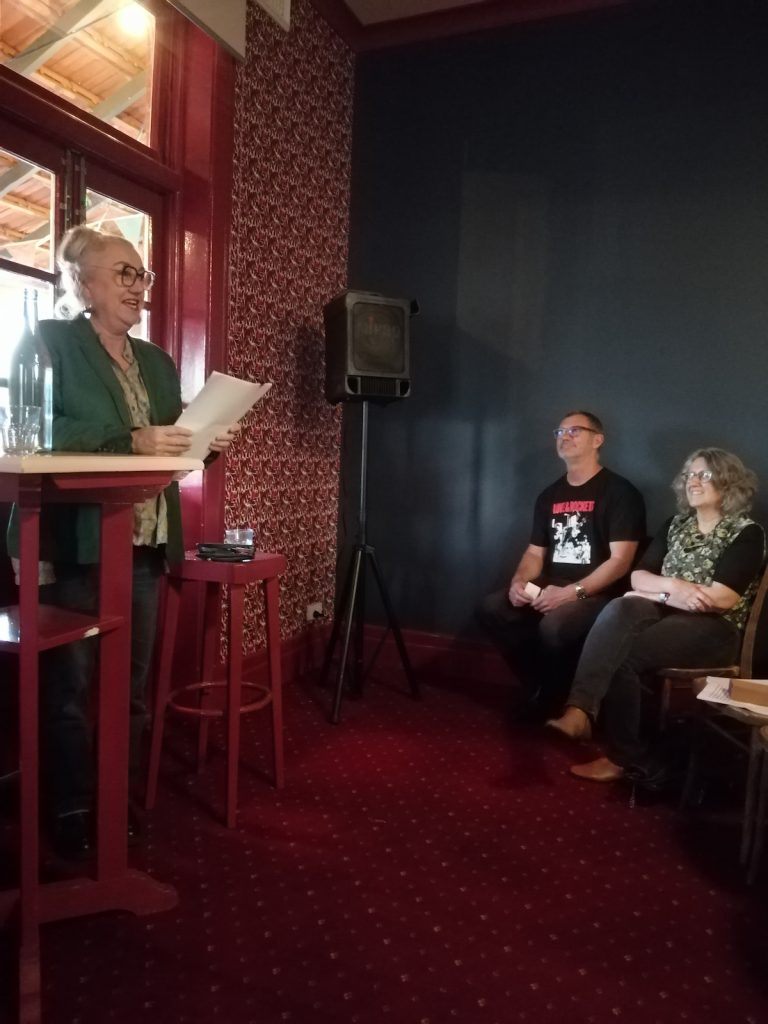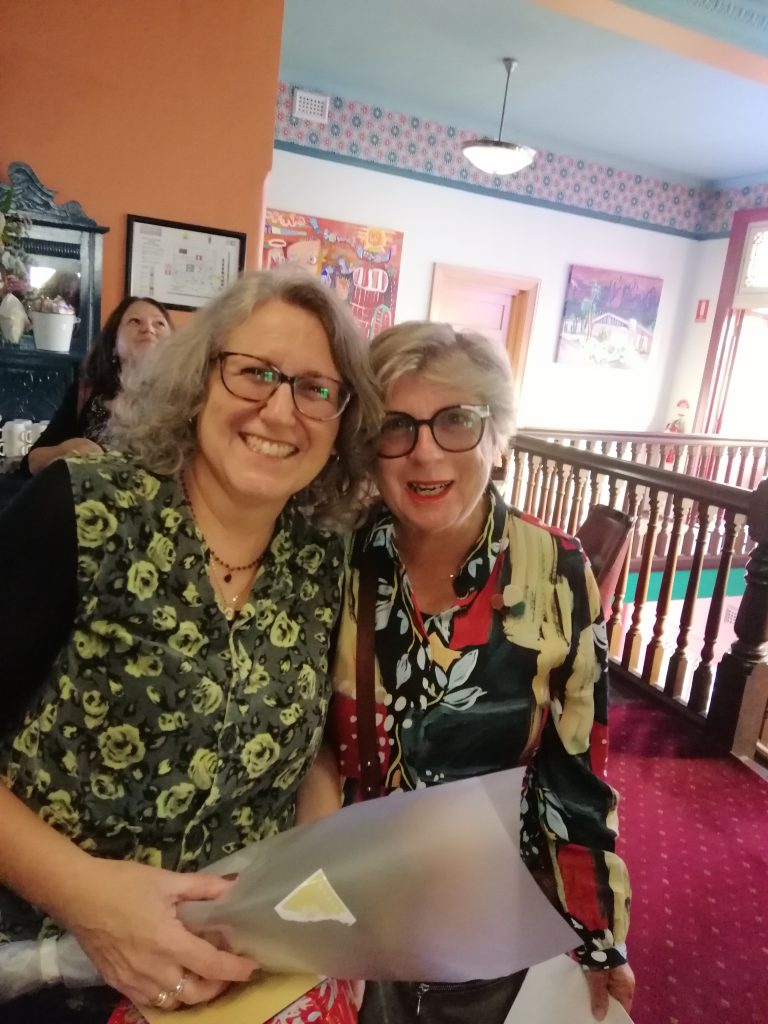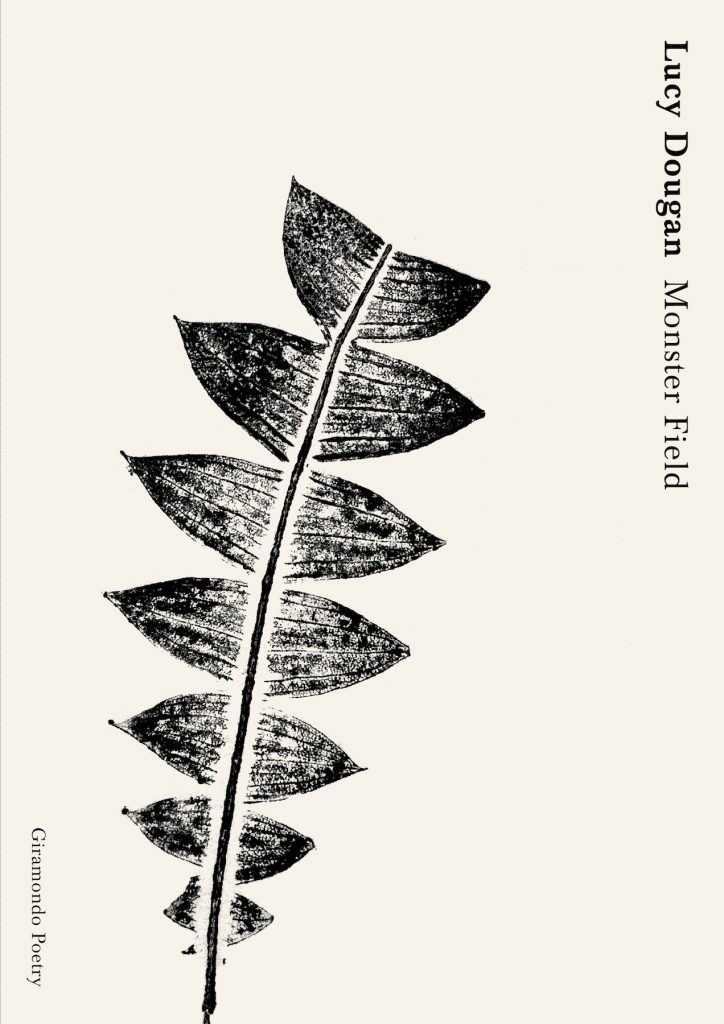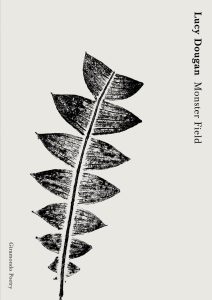Josephine Wilson’s launch of Monster Field by Lucy Dougan
Lucy Dougan’s poetry collection Monster Field was launched in November 2022 at The Balmoral Hotel in Perth, Western Australia. Below is the launch speech given at the event by Josephine Wilson, the Miles Franklin-winning author of Extinctions.
I want to acknowledge the Whadjuk people of the Noongar nation as the traditional custodians of this country and its waters and that we stand on Noongar country. I want to pay respects to Noongar elders past and present, and acknowledge their wisdom and advice, and note that Sovereignty has never been ceded.
Everyone who is, was or will be a reader and/or a writer is compelled to navigate the words of others. I say this not as if it is something onerous, as if words of others were a challenge to be surmounted, like K2.
I don’t mean that at all. Rather, I mean that we readers and/or writers, we want to see what others make of it all – words, life, the whole lot – and to do this, we have to find a way in. And with the poem, there are many ways in. We can begin by trying to appreciate the poet’s efforts in bringing a collection to publication. Endless are the arrangements of words, many the ways that lines begin and end; there are things to be decided – the words themselves, the way they fall upon this particular page and give way to the next. There are the spaces, breaks, long dash, short dash – the odd full stop here and there; capitals, lower case; nowhere is the writer’s fine hand more visible than in poetry, where there are no requisite left justifications and ragged right, no style guide, no A4/ 1.5 to make the decision for you; it is you who decides where this will end, where this will begin, where it will leave off and where it will return. The order of things; the division of parts. Depending on your personality type, all decision could be deferred, decided by dice, or the shape of the clouds at noon, or arrived at by some kind of clever algorithm. But regardless, the reader will think the decision yours.
It is my great pleasure and honour to speak about Monster Field, the powerful new collection by West Australian poet Lucy Dougan. It is a collection that rewards a reader attentive to the subtle labour of poetry, and how it seems effortless in its mastery. The introduction speaks of how in this collection the mundane becomes significant, charged; we find ‘weird extremities in the field of the ordinary.’ In Monster Field, the ordinary is rendered precious, and no more so than in our middle ages, that period of ‘disorientations’. In her own words, Lucy sees this work as about ‘survival at mid-life – about losing parents, gaining grandchildren, and change of life. And it’s a book about the ways in which mysterious connections are enlivening.’
As I set out, I turned the pages slowly, looking for a way in. I am not sure how you imagine the moment before you begin to read; do you stand as if before a clear sky? A vast sea? An empty desert? Float in deep space? In truth we know there is no such thing as empty spaces – and that includes on pages. We have to move across a book of poems with care, responsive to the complex terrain, its hidden resistances, its crevasses, attentive to the things that might fall in our path on a windy day – the tree across the road that force us to stop, turn around, double back, and return to questions of navigation.
Those of you who know Lucy Dougan’s work will also be aware that this is a sustained practice, built over years. Lucy has published a great deal and won many awards, including the WA Premier’s Prize in 2016 for The Guardians. Her work is read widely, and I have no doubt at all that Monster Field will see many, many readers cross its 91 pages. In support of my conviction, I have tried to make a preliminary map – a mud map – of my own first journeys into Monster Field to share with you. I apologise in advance for the well-worn metaphors (including that one just there) – but I have no need to be original. Besides, as Ms Dougan makes clear in her work, it is within the most general that we can find the most particular.
Please think of my map as written in some kind of childish invisible ink that is not meant to last, or with one those square red toys filled with magnetic filings that wiggle and disappear as we turn the knobs, or perhaps drawn on tea-stained paper, to be burned after reading with the unauthorised use of your mother’s box of matches.
As I embark, I note the epigraph by the English artist Paul Nash: ‘Monster Field. Where, where? Over there, to the left, the next field beyond the hedge. It was always the same, elusive and ubiquitous.’ That elusive referent.
At the front of Part 1, I can’t help but note in passing the words of English writer Deborah Levy bear a certain uncanny relevance: ‘It was true that I had no idea how to endure being alive and everything that comes with it.’
(And later, in ‘The Throne‘, the poet names the fear: ‘What does it mean/for home to be a failure?’)
I turn the page to ‘Why You Stopped Making Things‘. It begins:
Driving, you tell me
why it is
you stopped making things.
It was the terrible pressure
you felt that everything must have significance
and worse, significance for you
alone. You couldn’t bear it.
I stopped for a while on those lines. I thought, I must ask Ms Dougan about them. This is either very sad for the addressee, or else this person who the narrator is addressing is a narcissist. Shame on them!
But then I think, I am probably going the wrong way altogether; poetry is, after all, the art of indirection.
Art is everywhere in this collection. In ‘Art Detective’, our first-person narrator is watching TV.
I lie on the couch
like a beaten dog
as Philip Mould advances
his latest art forensics
and there are these absolutely
loose and liberated daubs
of greens and browns
in close up on the screen.
They are of the earth
in a surprising way, counter
to all that brocade, country houses,
rich people by the yard.
And from my beaten-dog pose
I fall in love with Gainsborough
How could I have not before?
But is that a real name? Mould? I take a detour to check. Indeed it is, and I can only imagine Philip is devoted to the total elimination of that which he is named after and remains on high alert for all signs of decline in the world of art, especially things like foxing.
Philip Mould’s suit combos are impeccable.
He is always consulting experts,
always moving crisply thought the weak light of investigation sites
– the galleries – but his eyes/look infinitely tired
as if has done so much looking for us.
I trust his close-ups.
As I stepped away briefly to the Wiki, I could not help but notice that Philip Mould lives in the Wirral, a wonderful word that is also a place near Birkenhead, Liverpool, where I too was raised, albeit briefly. I am thus led to consider the Wirral not as a location on a map, but as a word, as a sound, and decide I rather like it, and make a note to thank Philip Mould – and Ms Dougan – for reminding me of that fact.
Monster Field takes its title from the British artist Philip Nash, who I had known as a surreal chronicler of war, but not as an observer of trees.
Art is studded across the Dougan’s work. In ‘Crumpled‘, the narrator begins in a vernacular mode of introspection, in the devastating lines:
I need to sit with myself again
to know how I felt
before I got crumpled.
They are watching Paula Rego on TV. It is Rego’s artwork which gives the poem its title; ‘Crumpled’. The lithograph they’re discussing is not lovely; rather, writes Ms Dougan,
…It’s of Jane Eyre ugly,
not Jane Eyre prettified:
and she’s lying at ground zero
beneath her monstrously hatched skirts
in the room at Gateshead Hall.
And yet there’s no room,
only the sheet of miraculously restored paper
with all the crumples alive.
On TV Sheila Hancock asks Dame Paula
Have you ever felt like that, so like that?
Oh yes, she answers in the most phlegmatic of ways.
This collection honours the world of memories, of new life and old, and of objects. The object might be fixed, but the words swirl around it, passing across quickly, like the moon in an eclipse. Objects beckon in this collection: the throne-chairs, bags, dolls.
In ‘The Dolls‘, the narrator recalls how the old handmade dolls, those boxed-up objects, were not always hidden from sight:
Once they sat in the centre of things
with that loud silence
that dolls can own.
But they frightened the children
The smallest would tiptoe past
with eyes closed.
The precision of this writing banishes sentiment and nostalgia, offering instead a candour that puts a sharp tack in truth, then steps back to look.
An old handmade doll
is a strange makeshift business, an agreement between
any number of materials
to come together,
to stay together.
Is this what scared the children?
Is this what drew me to them –
their little tilt
of what it is
to be feminine
human.
These aides de memoire returns the narrator to another time:
I still remember the texture
of the day I found those dolls.
I swung down the street
feeling open, reckless,
and I swear the dolls called to me.
This short lyric of three stanzas leads from old dolls in a box to a point where the narrator locates her purchase as a transaction with her self, as the moment where she agreed to abide with the makeshift, improvised materials that constitutes life as a woman:
To this day, I think of it
as a return –
the moment I bought myself back –
agreed that warring selves
could live beneath my skin.
I apologise for dwelling on early poems in this collection – on Part 1. It’s because there are unexpected features in the landscape here that stop me in my tracks; sort of Mount Humiliations that speak to a woman of my provenance (if I dare use the language of Philip Mould, art historian and gallerist, collector of rare plants who lives in the WIRRAL).
I turn the page and feel something akin to apprehension. The title is ‘Home Economics’– or as the first line says,
Eco Homo, as we joked about it,
was clearly about being tied up
in knots of time wasting; about humiliation,
performance. What the fuck
is the golden triangle
of a kitchen anyway?
Ah, yes; those low-stakes feminine performance tests …(I remember a failed Brown Stew and a flat Scone). Such things offer Lucy Dougan the opportunity for a brief, dramatic flurry of fury – a souffle of fury, perhaps?
What the fuck/is the golden triangle/of a kitchen anyway?
And also activity sheets
involved being tethered
to yet another kind of string
in which you had to draw the snare line
to match shoes to an outfit.
Go ahead (full stop). Put the vampish mules
with the work overalls
and the high tops with the wedding dress
and run, run for your life – …
Flash your triangle all you like.
I turn the page and I can’t believe what I see: ‘High School Sewing’. Not Ms Dougan too?
I remind myself that this is not about me, that I am a selfish reader. I try to put aside my painful memories but for a moment endure once more the humiliation of being unable to complete a single simple pillowcase in class (Mother Cyril finished it for me and displayed it as my own for open day, but she did not fool my own mother, who raised an arch brow in my direction as she turned the cotton case labelled JW inside out to check the seams. She had no illusions as to my capacities with the machine).
I love this work – ‘High School Sewing’. The first lines are short:
Wincey – but
really – wincey,
a baby word
from a nursery rhyme
is what was doled out/ by the metre.
You could make a layette, girls
Because who would know
when you might need it?
Strange shapes and sizes
dolly small or too big
…Portion control is what it was.
Getting ready to get ripped off
in all sorts of ways. It was practiced in Home Ec. too.
Measly sizes from magazine recipes:
toad-in-the-hole and egg-in-the-nest.
This is a return of the familiar, seen anew, yes, but familiar only in the way that a tuppence might be familiar; virtually unrealisable. I had to look things up to stitch them down:
Wincey: noun BRITISH: a strong, lightweight twilled fabric, typically made of a mixture of wool with cotton or linen.
Until I read Ms Dougan’s ‘High School Sewing’, I believed that a layette was one of those handmade padded blue or pink cot liners, rimmed in ricrac, made for a tiny newborn – hence lay (as in lay down) and ette – as in the French suffix for small, or, in Italian, –ino, or -ina.
While I was with Wincey – NOT Whimsy, I couldn’t help but note that far less pertinent questions were being asked of Google:
Is Pittering a real word?
Is Spizzerinctum a real word?
How do you spell Melage?
Does the word Successless exist?
Is Confuzzle a real word?
But I knew I had briefly left the terrain of Monster Field because I was a little afraid of its elusive exactness, of how it spoke of things I knew something of: loss, regret, death, wallpaper, found objects, womanhood, lost opportunities.
In ‘The Narrows (One, Two and Three)‘ voices carry across the dark water, as they do on a still night on the river: Dougan writes: ‘sound bounced around/the cold shadowed column.’ I know that sound as you pass under the bridge in a small boat, or on a bike.
In ‘The Narrows’ there is what was, and is no longer: a father, sisters, ‘skiffs and freedom’. Here memory and landscape are feminised, brought back to the body. Dougan’s river is ‘narrow waisted at the closest part,’; later, ‘the water gathered glamorous as a waist in satin.’
I love the specificity of this voice. It is a brave voice. In “Blue-black”, Dougan writes,
These days
I’m fading
I have to colour myself in;
Lips, brows, lashes, hair,
with little tools
that I’ve never really understood.
I thank fate for my mother
so oblivious to all this,
and for my daughter
great confident wielder of Kohl.
In ‘Your Shade‘, I.M. Fay Zwicky, it is the loss of what some might call feminine, inessential, minor – a signature shade of lipstick – that drives the lines towards their end.
They don’t make the lipstick
you wear any more.
The small grief of this niggles you
as if some part of your armoury
or what it is that helped you face
the day is gone forever.
You enlist me in the hunt.
In the past I’ve done your footnotes,
faxed handwritten pages,
but this, this archive
of lost shades
is a tipping point
into something that lies
stubbornly beneath/everything.
As a mark of decline, of age, of death, the discontinued product – subject to ‘the phase out’, known by ‘product codes/ guttering out to deadstock’ – invades everything:
…your bare lips kept moving
but the sounds they made,
the questions they asked,
began to get lost in the queue.
I want to say so much more about this collection. There is the trace of French and Italian films, there are home movies. In the apostrophic ‘Leonie’ an epoxy resin bust survives endless room and house moves; like the Grecian Urn, or perhaps a chipped statue of the Virgin in the corner of the lounge, Leonie is called upon to provide something, in this case constancy and salvation, in what comes close to secular prayer:
Paid artist’ model,
your face has lived with the family for decades
…
I cannot see you as empty for in your hollow head lives the clamour
of us all.
And something else, you still abide with us
even though our mother and father are dead and gone.
Stranger, stay with us, never leave us.
There are things to be sorry for; like throwing out the little horses. Things are tossed in fits of rage, in moments deeply regretted, those stubborn memories that remain like old wallpaper, under the surface even if plastered over.
I too wish I had kept all my chipped and broken things. In ‘The Horses I Threw Out’, Dougan writes,
O little abandoned horses,
I am sorry, I am sorry.
Where was it that we travelled
my unharnessed companions?
In ‘Wait (Aspete)’ the sheets are both cotton and marble, as if writing about the body and material transformed the ephemeral into something hard and permanent, while retaining the appearance of the delicate and temporal, like words of a poem on a page.
Monster Field ends with ‘Little Ditty’.
I am an irregularity
in a space of ironed out irregularities
Or if these are entirely impossible to eradicate
they are bagged up
and made a virtue of at the raw end.
I am sure you have your own way of entering this wonderful collection. I began at the beginning, but you are free to enter where you like. The book is there for you to read. It is brilliant, and congratulations again to Lucy Dougan and Giramondo.




